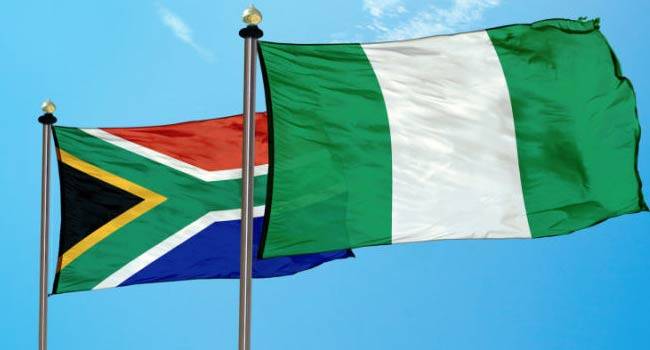SA Xenophobia Fallout: What Will Really Happen To SA Businesses If They Are Forced Out Of Nigeria?

South Africans Are At It Again And Nigerians Are Livid
Although xenophobic attacks by South Africans affect people from many other countries including Zimbabwe, Tanzania, Botswana, Ethiopia, Mozambique, and Ghana, most of the South African angst can be thought to be directed at Nigerians who are rumoured to be numbering up to 400,000; a figure that is yet to be confirmed.
The #Xenophobia attacks by some South Africans against Nigerians and other foreign Nationals are completely heartbreaking. Sad to see people that suffered through decades of apartheid, violence and hatred, now turning around to do the same/worse to others. (1)
— Banky Wellington (@BankyW) September 3, 2019
It’s not #Xenophobia it is #SouthAfricaPhobia . This level of hate is unbelievable. An immigration officer at the point of entry scoffed at me and said we only come to take their business and their women. It was blatant and rude. So no SA isn’t a favorite place for me. #StopHate
— AuduMaikori (@Audu) September 3, 2019
Last time I was in South Africa, the cab guy who took me to the hotel expressed the highest levels of discontent with life. He described how poor they are and how he hates other tribes, including the Zulus.
I cornered 3 South African men, and asked same questions:
— Joey Akan (@JoeyAkan) September 3, 2019
The love-hate relationship between two of Africa’s largest economies is well-documented. Even as both countries retain some civility in their diplomatic ties, there is hardly any love lost on the streets.
And because Nigerians are wired to move to any part of the world and thrive, there’s probably more than a fair amount of Nigerians living in South Africa than the total number of South Africans that have ever visited Nigeria.
So, when xenophobic attacks like this recent one spring up, there’s a good chance that Nigerians will be caught in the crossfire. And even as there haven’t been any official reports on the casualties and losses from this recent attack, there’s at least one video on social media showing the charred remains of several vehicles set ablaze at a car dealership owned by a Nigerian in SA.
This is very sad and painful to watch. Very sad. https://t.co/KNDsYYqbtK
— Oluyomi Ojo (@OluyomiOjo) September 3, 2019
– #Xenophobia Nigerians begin to destroy MTN modems with provocating hashtags #XenophobicAttack #MtnMustGo pic.twitter.com/ksYyBEzCFS
— SubDeliveryZone (@SubDeliveryZone) September 3, 2019
I personally won’t be shopping at @Shoprite_NG any more. I’m going the whole nine yards. No more SA businesses for me. Nothing performative about it too. I just cannot be fueling the same people killing me.
— InvestGod (@eldivyn) September 3, 2019
I just smashed my DSTV console where I am now, 2 more to go. This is how show my solidarity. Dang DSTV, Shoprite and all South Aficans. I am berserk but I can’t kill anybody and won’t, the way I can express my vehement disapproval is by cutting#EnoughIsEnough#SayNoToXenophobia pic.twitter.com/8p9sLMvUHA
— Enigma (@Enigma_Gpes) September 3, 2019
#shoprite My one man peaceful protest at their Surulere store this morning, against #Xenophobia pic.twitter.com/Nr0UnsCnF1
— IG@thecourseadviser (@MegRicketts) September 3, 2019
I call on Nigerians with an @MTNNG SIM to SWITCH. Each RECHARGE you make STRENGTHENS the killer of our brothers and sisters. If you have @DStv, SWITCH. Your SUBSCRIPTION ELONGATES SA’s arrogance. Avoid @Shoprite_NG. You shop WRONG if you shop there!#StopKillingNigeriansInSA
— Reno Omokri (@renoomokri) September 3, 2019
Add the violence to the harassment of Nigerians by South African officials at airports and even on the streets of Cape Town and Johannesburg, and you get why scores of Nigerians are very livid and are currently clamouring for a boycott or closure of all South African businesses in Nigeria. But will that amount to any good? Well, the numbers say “not quite.”
How Much Will A Nigerian Boycott Affect South African Businesses?
Will South African companies suffer if they are forced out of the Nigerian market? Yes, they will. But not so much that they will be totally crippled.
With a GDP of over USD 350 Bn and a population currently estimated to be nearly 200 million people, Nigeria is undoubtedly Africa’s largest economy and possibly the largest market on the continent. And South African companies can be thought to know this given that they seem to want to reach Nigeria every time talks of expanding across Africa is on the table.
Names like MTN, Multichoice, and Shoprite are leaders of their respective spaces in the Nigerian market. Stanbic is another emerging SA brand in Nigeria. And this is probably why they are usually the names on everyone’s lips whenever there is any talk of a boycott of SA businesses in Nigeria.
Nigerian students gives South African companies in Nigeria Seven days ultimatum to leave Nigeria or destructions!! #SAShutdown #SouthAfrica #SayNoToXenophobia #XenophobicAttacks
pic.twitter.com/a7THZ2lOAz— Tall Black Boii (@_starbiola) September 3, 2019
Indeed, a Shoprite outlet in Ogun State, Nigeria, was besieged by a group of protesters early last month after another bout of xenophobic attacks in South Africa.

This protest happened about the same period as when a group of Nigerians, under the aegis of the National Association of Nigerian Students (NANS), issued a 7-day ultimatum to SA businesses to vacate Nigeria or face dire consequences.
So, What Will Happen To SA Companies If They Left Nigeria?
Except the boycott is purely related to refusing to further enrich an oppressor and completely unconnected to bringing SA business to their knees (as some have suggested), a boycott or closure of SA businesses in Nigeria won’t do much harm to those companies.
Those businesses wouldn’t exactly crumble. As a matter of fact, those who see it as a way of tanking the finances of those companies may not only be mistaken but also be overestimating the importance of the Nigerian market to those SA companies. At least, that’s what the facts say.
Looking at the financials of MTN Group for 2018, the Group’s revenue-by-country shows that Nigeria accounted for 28 percent of the total — almost a third. By all standards, that’s pretty sizeable, it’s quite a healthy amount from a single country. But that also means 72 percent of the company’s total revenue came from other markets.

For Stanbic, its financials for 2018 shows that as much as 61 percent of its total revenue came from South Africa alone, with other African regions accounting for the rest. And it is well-known that the financial services institution is not exactly a leader in the Nigerian financial services space.

Furthermore, looking at Stanbic’s top five contributors to African headline earnings apart from South Africa, Nigeria is 4th on that list with countries like Angola, Ghana, and Mozambique contributing more to the bank’s earnings.
Moving on, the popular supermarket chain, Shoprite, has a total of 639 stores across Africa, and 471 of those stores (73 percent) are located in South Africa alone. The rest of its stores are distributed across the rest of Africa. In addition, Shoprite’s financial report for 2018 also showed that outside of South Africa, its largest operations can be found in Angola where it gets its largest revenues beyond the shores of SA.
Also, considering the 2016 to 2018 financials of Multichoice, the parent company of DStv and GOtv, it can be found that the lion share of revenue growth and subscriber growth came from South Africa.
By all accounts, while it is true that the revenues of these companies will take a hit if Nigerian operations are shut down as Nigeria remains an important part of their business, talks of their respective market shares disappearing might be a bit of an exaggeration.
And considering the fact that Nigerians make up over 80 percent of the workforce in SA businesses in Nigeria, a boycott or total closure of their operations will mostly result in huge job losses for people in Nigeria. Such measures are, thus, not going to help matters in the grandest scheme of things.
Nigerians are the people employed in their vast numbers at
MTN
Dstv
Shoprite
StanbicThe onus is on the south African government to protect the people who live and work in their country
Boycotting South African businesses in Nigeria wont stop the Xenophobia https://t.co/lqCfU6FAeT
— Cinderella Man (@Osi_Suave) September 3, 2019
What Will Be The Real Impact Of A Boycott Or Closure?
While many Nigerians are greatly angered by the ugly development and are calling for drastic measures like attacking big SA companies in Nigeria and boycotting their services, some have remained objective — choosing not to hop on the bandwagon of persons who think getting one back at SA companies in Nigeria will offer some measure of recompense.
David Hundeyin, a columnist on several local and international publications and the CEO of TupstartNG; a research and copywriting agency in Nigeria, is convinced that a boycott or closure of SA businesses in Nigeria is not the best move.
“A large scale boycott of SA businesses (very unlikely to be even remotely successful) may have some limited success at government level in SA because it may get those investors to lobby the SA govt to do something about the violence,” he tells WeeTracker.
“But whatever solution that will arrive at will only be temporary. It doesn’t fix the basic underlying problem of the misorientation of South Africans toward other (black) Africans.”
He continues: “Attacking SA businesses, on the other hand, will worsen the situation because information travels quickly. The rioters in SA will hear what they are already itching to hear, which is ‘Nigerians are attacking our people’ and then step up the already terrible violence.”
On the subject of how much a Nigerian reprisal will hurt the SA business, he has this to say:
“Something we have to accept is that we [Nigerians] are not in a position of power here. How much would a Nigerian business proscription hurt SA investors? A significant bit, but not too much.”
“Let’s put it this way. The largest (sometimes) or 2nd largest listed entity on the Nigerian Stock Exchange is MTN. But MTN barely makes the top 5 on the Johannesburg Stock Exchange. Naspers, which until recently owned Multichoice/DStv, was worth approximately 3 times the entire Nigerian Stock Exchange on its own.”
He adds: “Nigeria may be Africa’s largest economy on paper, but it’s an economy of pennies and kobo with 160 million+ people. We have Africa’s 2nd poorest market after DRC and our companies are only big by West African standards. So, boycotting SA businesses is pretty much a waste of our time, and attacking them would worsen the situation.”
Featured Image Courtesy: Channels